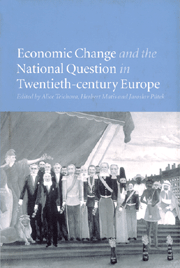Book contents
- Frontmatter
- Contents
- List of figures
- List of tables
- Notes on contributors
- Acknowledgements
- Introduction
- 1 Nationalism and the economic question in twentieth-century Ireland
- 2 Economic aspects of the nationality problem in nineteenth- and twentieth-century Belgium
- 3 The economy as a pushing or retarding force in the development of the German question during the second half of the twentieth century
- 4 Lusatian Sorbs in Germany before the Second World War: the influence of the economy on the national question
- 5 Unequal regional development in Switzerland: a question of nationality?
- 6 The Portuguese national question in the twentieth century: from Spanish threat to European bliss
- 7 From autarky to the European Union: nationalist economic policies in twentieth-century Spain
- 8 The economic background to the Basque question in Spain
- 9 Economic change and nationalism in Italy in the twentieth century
- 10 National integration and economic change in Greece during the twentieth century
- 11 National identity and economic conditions in twentieth-century Austria
- 12 Economic, social and political aspects of multinational interwar Czechoslovakia
- 13 Nationality and competition: Czechs and Germans in the economy of the First Czechoslovak Republic (1918–1938)
- 14 Economic aspects of Slovak national development in the twentieth century
- 15 Economic change and national minorities: Hungary in the twentieth century
- 16 Economic background to national conflicts in Yugoslavia
- 17 Economic differentiation and the national question in Poland in the twentieth century
- 18 Economy and ethnicity in the hands of the state: economic change and the national question in twentieth-century Estonia
- 19 Changing structure and organisation of foreign trade in Finland after Russian rule
- 20 Economic change and the national question in twentieth–century USSR/Russia: the enterprise level
- Index
4 - Lusatian Sorbs in Germany before the Second World War: the influence of the economy on the national question
Published online by Cambridge University Press: 01 September 2009
- Frontmatter
- Contents
- List of figures
- List of tables
- Notes on contributors
- Acknowledgements
- Introduction
- 1 Nationalism and the economic question in twentieth-century Ireland
- 2 Economic aspects of the nationality problem in nineteenth- and twentieth-century Belgium
- 3 The economy as a pushing or retarding force in the development of the German question during the second half of the twentieth century
- 4 Lusatian Sorbs in Germany before the Second World War: the influence of the economy on the national question
- 5 Unequal regional development in Switzerland: a question of nationality?
- 6 The Portuguese national question in the twentieth century: from Spanish threat to European bliss
- 7 From autarky to the European Union: nationalist economic policies in twentieth-century Spain
- 8 The economic background to the Basque question in Spain
- 9 Economic change and nationalism in Italy in the twentieth century
- 10 National integration and economic change in Greece during the twentieth century
- 11 National identity and economic conditions in twentieth-century Austria
- 12 Economic, social and political aspects of multinational interwar Czechoslovakia
- 13 Nationality and competition: Czechs and Germans in the economy of the First Czechoslovak Republic (1918–1938)
- 14 Economic aspects of Slovak national development in the twentieth century
- 15 Economic change and national minorities: Hungary in the twentieth century
- 16 Economic background to national conflicts in Yugoslavia
- 17 Economic differentiation and the national question in Poland in the twentieth century
- 18 Economy and ethnicity in the hands of the state: economic change and the national question in twentieth-century Estonia
- 19 Changing structure and organisation of foreign trade in Finland after Russian rule
- 20 Economic change and the national question in twentieth–century USSR/Russia: the enterprise level
- Index
Summary
Geographical position, climatic conditions and natural wealth, together with the economic and social development closely related to these factors, have always played a fundamental role in the life of states, peoples or sub-communities. These factors were of particular importance in the case of the smallest distinct Slavonic ethnic group still in existence – the Lusatian Sorbs. In the medieval and early-modern periods the geographic–economic factor tended to promote the survival of the Sorbs' language and specific social characteristics, hemmed in on all sides by Germans. The Slav areas of Lusatia were mainly poor and sparsely settled and had an incomparably smaller share of towns and town populations than the German-speaking areas that surrounded them. For this reason the Sorbs could live in a degree of isolation from the German environment and were able to develop in their own way, with a significant degree of autonomy. Hartmut Zwahr even goes so far as to speak of the Sorbs' insular existence, citing Jakub Lorenc-Zalěsky's characterisation of the group as ‘an island of the forgotten’.
This situation may be convincingly demonstrated using the example of the later Saxon Lusatia as described by Karlheinz Blaschke. In 1835, for instance, in the Saxon territory populated by Sorbs, there was only one town with more than 10,000 inhabitants (Budyšin (German: Bautzen)), and two towns with a population of between 1,000 and 5,000 (Lubij (German: Löau) and Mužakow (German: Muskau)).
- Type
- Chapter
- Information
- Publisher: Cambridge University PressPrint publication year: 2000

